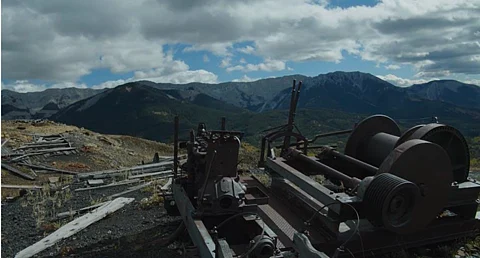

In a scathing indictment of more than a century of colonialism, local First Nations groups are solidly in favour of coal mining on their traditional lands on the eastern slopes of the Rocky Mountains.
Instead it is the traditional farming and ranching interests that remain opposed to Australia-based Northback’s proposed Grassy Mountain mine in the Crowsnest Pass, an Alberta Energy Regulator (AER) public hearing in Calgary heard Wednesday.
Representatives from the Piikani and Stoney Nakoda told them Northback’s proposed Grassy Mountain redevelopment would allow aboriginal communities to participate in the reclamation of sacred ancestral territory while offering meaningful employment and economic benefits that have been denied to them despite signing Treaty Seven with the Crown more than a century ago.
Northback is proposing to drill about three dozen core holes on Crown and private land to asses groundwater conditions ahead of a formal application to proceed with a full-blown commercial development project for the site, which has been mined intermittently for the past 75 years.
Panel members heard such applications are not usually subject to full-blown public hearings and are routinely granted to oil and gas companies. In fact, similar drilling programs have been regularly performed at the site near Coleman since the 1970s, including Northback’s previous predecessor companies.
Nonetheless, the the present ‘exploration’ program has broad support from the two First Nations most directly impacted.
Piikani spokesperson Ira Provost insisted Northback’s proposed drilling program would allow his people to “operationalize traditional knowledge” while gaining much needed data to allow it to make “an informed decision” on whether to proceed with a full-blown mine in accordance with its traditional beliefs of respect for the land.
Northback is “providing cultural and economic opportunities denied the Piiikani Nation for over a century,” he said. “Northback continues to demonstrate support for the Piikani Nation.”
Provost was quick to note, however, that support for the drilling program does not equate to automatic support for a larger mining venture. That will have to be considered at the appropriate time.
But its participation will allow it to “monitor” reclamation in a way that was previously denied the Piikani people when mining first began decades ago. That said, Provost indicated the Piikani have no formal benefits agreement with Northback although band members have been employed as site monitors and security guards.
Northback is “providing cultural and economic opportunities denied the Piiikani Nation for over a century,”
Ira Provost
Likewise, William Snow — on behalf of the Bearspaw, Chiniki, and Goodstoney tribes that make up the Stoney Nakoda nation — argued that rejecting the permit would deny them the opportunity to impart their traditional knowledge of the land on its reclamation.
The Stoney Nakoda advocate a “bi-cultural” approach that considers Western science alongside its “everlasting relationship with the land.”
“We weren’t consulted on the original project,” he said. “We see this as an opportunity to be part of that reclamation process… and hopefully have the opportunity to employ our traditional knowledge. We’ve never had that opportunity before.”
Both men made thinly veiled jabs at the status quo that impoverishes First Nations and denies them meaningful economic benefits from resource development on their traditional lands.
“Many of our First Nations are impoverished,” Snow continued. “So we want to be able to work with Northback. We want employment. We want to consult.”
Ron Davis, the Reeve of the MD of Ranchlands — which is opposed to the application — reiterated its position but did not receive any question under cross examination from either the Piikani or Stoney Nakoda.
The hearing continues through Thursday.
